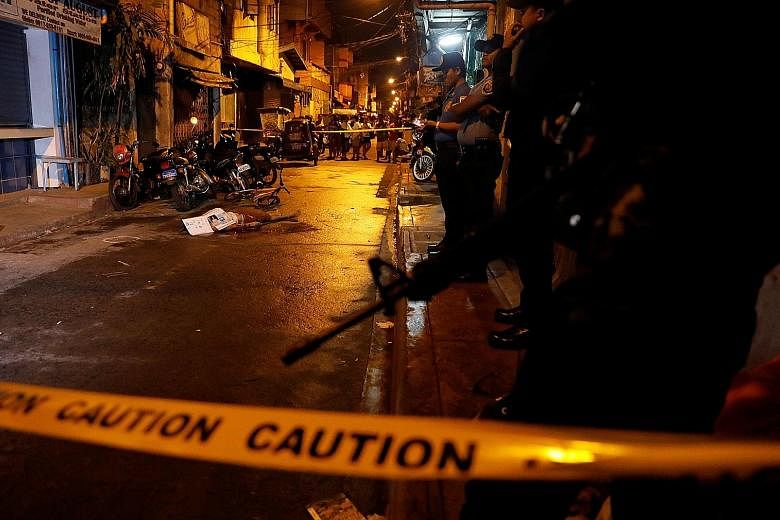MANILA • The Philippine Justice Secretary yesterday brushed aside accusations that police killings of thousands of drug suspects may be crimes against humanity, stating that criminals are not human.
Amnesty International had earlier in the day accused the police of murdering defenceless people or paying others to kill as part of President Rodrigo Duterte's drug war, and said the deaths may amount to crimes against humanity.
"The criminals, the drug lords, drug pushers, they are not humanity. They are not humanity," Justice Secretary Vitaliano Aguirre said, commenting on Amnesty's report.
"In other words, how can that be when your war is only against those drug lords, drug addicts, drug pushers. You consider them humanity? I do not."
Among a litany of alleged crimes, Amnesty accused the police of shooting dead defenceless people, fabricating evidence, paying assassins to murder drug addicts and stealing from those they killed or the victims' relatives.
It also said the police were being paid by their superiors to kill, and documented victims as young as eight years old.
"The police are behaving like the criminal underworld that they are supposed to be enforcing the law against," the report said.
It said the vast majority of the killings it investigated "appear to have been extra-judicial killings - unlawful and deliberate killings carried out by government order or with its complicity or acquiescence".
"The Duterte administration's relentless pressure on the police to deliver results in anti-drug operations has helped encourage these abusive practices," Amnesty said.
The police have reported killing 2,555 people since Mr Duterte took office seven months ago and immediately launched his war on crime, while nearly 4,000 others have died in unexplained circumstances, according to official figures.
Mr Duterte has often made comments echoing sentiments similar to Mr Aguirre's.
"Crime against humanity? In the first place, I'd like to be frank with you: Are they humans? What is your definition of a human being?" Mr Duterte said last August, referring to drug offenders. "Human rights? Use it properly in the right context if you have the brains."
The Philippine National Police (PNP) and the Presidential Office issued statements rejecting many of the claims in the Amnesty report.
"The PNP has always observed and upheld respect for human rights," a police statement said.
National police chief Ronald Dela Rosa rejected claims that officers were getting secret bonuses for killing alleged drug offenders, and insisted that only 2 per cent of the police force was corrupt.
This was despite Mr Duterte saying on Monday that the police force was "corrupt to the core", with nearly 40 per cent of all officers involved in graft, and ordered them to suspend their activities in the drug war. This move came in the wake of the killing of a South Korean businessman by rogue drug- squad police. The Philippine Drug Enforcement Agency, a body a fraction of the size of the PNP, has taken over the lead in fighting drugs and Mr Duterte has suggested he may need the military's help.
Yesterday, the Defence Ministry asked Mr Duterte to issue a formal order for the military to play a role in his war on drugs, including granting troops powers to arrest "scalawag" police. It asked for "an official order regarding this presidential directive to serve as a legal basis for our troops to follow".
AGENCE FRANCE-PRESSE, REUTERS

